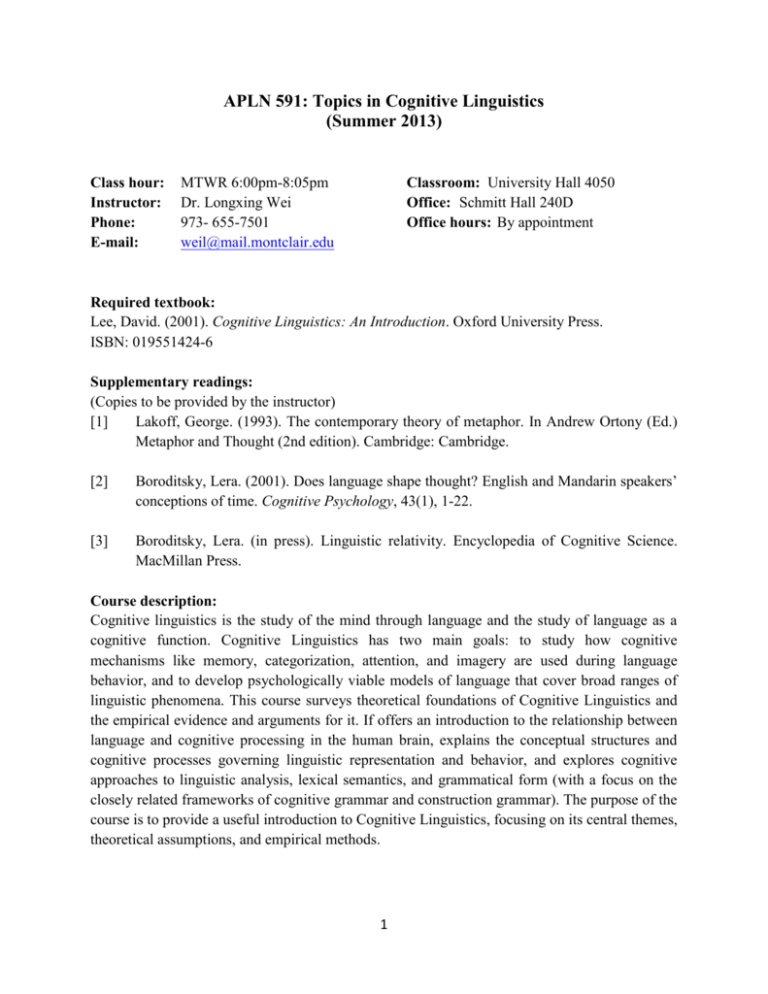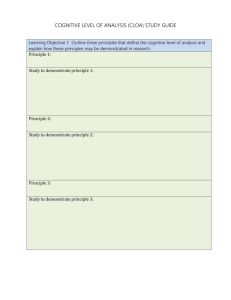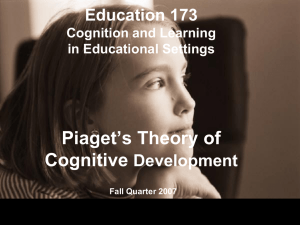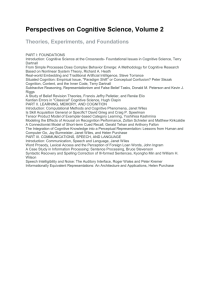APLN591Topics-in-Cogn-Ling
advertisement

APLN 591: Topics in Cognitive Linguistics (Summer 2013) Class hour: Instructor: Phone: E-mail: MTWR 6:00pm-8:05pm Dr. Longxing Wei 973- 655-7501 weil@mail.montclair.edu Classroom: University Hall 4050 Office: Schmitt Hall 240D Office hours: By appointment Required textbook: Lee, David. (2001). Cognitive Linguistics: An Introduction. Oxford University Press. ISBN: 019551424-6 Supplementary readings: (Copies to be provided by the instructor) [1] Lakoff, George. (1993). The contemporary theory of metaphor. In Andrew Ortony (Ed.) Metaphor and Thought (2nd edition). Cambridge: Cambridge. [2] Boroditsky, Lera. (2001). Does language shape thought? English and Mandarin speakers’ conceptions of time. Cognitive Psychology, 43(1), 1-22. [3] Boroditsky, Lera. (in press). Linguistic relativity. Encyclopedia of Cognitive Science. MacMillan Press. Course description: Cognitive linguistics is the study of the mind through language and the study of language as a cognitive function. Cognitive Linguistics has two main goals: to study how cognitive mechanisms like memory, categorization, attention, and imagery are used during language behavior, and to develop psychologically viable models of language that cover broad ranges of linguistic phenomena. This course surveys theoretical foundations of Cognitive Linguistics and the empirical evidence and arguments for it. If offers an introduction to the relationship between language and cognitive processing in the human brain, explains the conceptual structures and cognitive processes governing linguistic representation and behavior, and explores cognitive approaches to linguistic analysis, lexical semantics, and grammatical form (with a focus on the closely related frameworks of cognitive grammar and construction grammar). The purpose of the course is to provide a useful introduction to Cognitive Linguistics, focusing on its central themes, theoretical assumptions, and empirical methods. 1 Course objectives: Upon completing the course, students should: 1. understand the essential theoretical foundations of Cognitive Linguistics and the arguments supporting it; 2. be able to explain the relationship between language and conceptual processing in the human brain, and the relationship between the conceptual structures and cognitive processes governing linguistic representation and behavior; 3. be able to apply cognitive approaches to linguistic analysis, lexical semantics, and grammatical form. Course requirements and policies: 1. Exercise assignments: A minimum of 6 assignments. Late assignments are penalized one letter grade for each day elapsed after the due date. All assignments must be submitted as a condition for passing the course, even if too many days have elapsed for the assignment to receive a passing grade. 2. Students must be responsible for their absences and the sequential course work. Evaluation and grading: The assignment average counts toward the final course grade. Failure to fulfill any of the course requirements will result in a final course grade of “F.” Class participation (attendance and inclass discussion and performance) is included in the evaluation of the student’s course work. 6 assignments 90% Class participation 10% Exercise assignments and presentations are graded based on the following letter scale: A 100-93, A- 92-90, B+ 89-86, B 85-83, B- 82-80, C+ 79-76, C 75-73, C- 72-70, D+ 69-66, D 65-60, F 59- Tentative Daily Syllabus Note: 1. Each exercise assignment is due on the first day of the following week. 2. If necessary, the instructor will select only certain sections or parts of a listed chapter and announce them in advance. 3. The following schedule is subject to change with prior notice as class needs dictate. May 20 Introduction to the course Chapter 1: Basic Concepts 2 May 21 Chapter 1: (continued) May 22 Chapter 2: Space May 23 Chapter 3: Extensions from Spatial Meanings May 27 Chapter 3 (continued) Chapter 4: Radial Categories May 28 Chapter 4 (continued) Chapter 5: Constructions May 29 Chapter 5 (continued) Chapter 6: Mental Spaces May 30 Chapter 6 (continued) June 3 Supplementary reading [1]: The Contemporary Theory of Metaphor (George Lakoff) June 4 Supplementary reading (continued) June 5 Chapter 8: Count and Mass Nouns June 6 Chapter 9: Perfective and Imperfective Uses of Verbs June 10 Chapter 10: Causation and Agency June 11 Chapter 10 (continued) Supplementary reading [2]: Does Language Shape Thought?: Mandarin and English Speakers’ Conceptions of Time (Lera Boroditsky) June 12 Chapter 13: Creativity and the Nature of Meaning June 13 Supplementary reading [3]: Linguistic Relativity (Lera Boroditsky) General review 3





